CISPLATIN - INJECTION
PHONETIC PRONUNCIATION: (sis-PLAT-in)
COMMON BRAND NAME(S): Platinol-AQ
GENERIC NAME(S): cisplatin
Uses
USES: Cisplatin is used to treat various types of cancer. It is a chemotherapy drug that contains platinum. It is used alone or in combination with other medications to slow or stop cancer cell growth.
How to use CISPLATIN - INJECTION
HOW TO USE: This medication is usually given by injection into a vein by a health care professional. The dosage is based on your medical condition, body size, and response to therapy. Courses of cisplatin treatment should not be given more often than once every 3 to 4 weeks. Consult your doctor or pharmacist for more details. During treatment with this medication, it is important that you take in more fluids than usual and pass urine frequently to help avoid kidney side effects. Intravenous fluids should be given with this medication. Also, ask your doctor how much fluid you should drink and follow these instructions carefully. If this medication comes into contact with your skin, wash your skin right away and completely with soap and water.
Side Effects
Precautions
Interactions
Overdose
Images
Reviews
Faq for CISPLATIN - INJECTION
Cisplatin injection is used to treat various types of cancer, including testicular, ovarian, bladder, and lung cancer.
Cisplatin works by interfering with the growth of cancer cells and damaging their DNA, which ultimately leads to their destruction.
Cisplatin injection is usually given intravenously (directly into a vein) by a healthcare professional in a hospital or clinic setting.
Common side effects of cisplatin injection include nausea, vomiting, loss of appetite, hair loss, fatigue, and kidney damage. It can also cause allergic reactions and hearing loss in some cases.
The dosing schedule for cisplatin varies depending on the type and stage of cancer being treated. It is typically given in cycles, with a rest period in between to allow the body to recover.
Yes, cisplatin injection can interact with certain medications, including some antibiotics, anti-inflammatory drugs, and diuretics. It is important to inform your healthcare provider about all the medications you are taking before starting cisplatin treatment.
Cisplatin is generally not recommended during pregnancy or breastfeeding, as it may harm the developing baby or be passed through breast milk. It is important to discuss the risks and benefits with your healthcare provider in such cases.
Cisplatin injection is usually stored in a refrigerator at a temperature between 2°C and 8°C (36°F and 46°F). It should be protected from light and kept out of the reach of children.
If you miss a scheduled dose of cisplatin, it is important to contact your healthcare provider for guidance. They will determine the best course of action based on your individual situation.
Warning
WARNING: Cisplatin may cause severe kidney problems or very serious allergic reactions. Hearing loss (more common in children), bleeding problems, a decrease in your body's ability to fight infections (bone marrow suppression), and severe nausea and vomiting may occur as well. Your risk of these problems increases with higher doses or longer treatment with cisplatin. Tell your doctor right away if you develop any of the following symptoms: change in the amount of urine, rash, trouble breathing, swelling of the face, fast heartbeat, dizziness, ringing in the ears, hearing loss, easy bruising or bleeding, unusual tiredness or weakness, signs of infection (e.g., fever or persistent sore throat), nausea, or vomiting.
Disclaimer
IMPORTANT: HOW TO USE THIS INFORMATION: This is a summary and does NOT have all possible information about this product. This information does not assure that this product is safe, effective, or appropriate for you. This information is not individual medical advice and does not substitute for the advice of your health care professional. Always ask your health care professional for complete information about this product and your specific health needs.
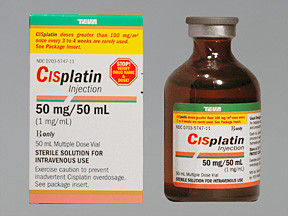
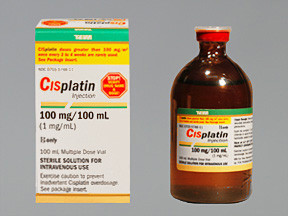
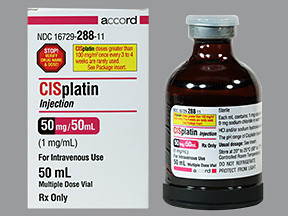
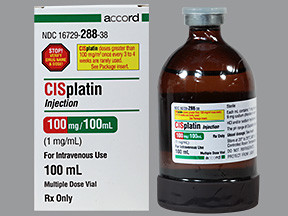
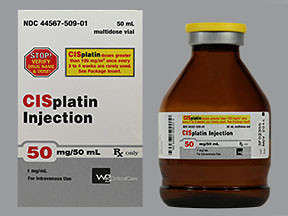
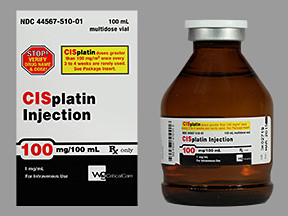
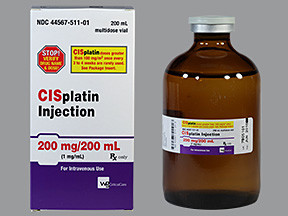

No Reviews Yet